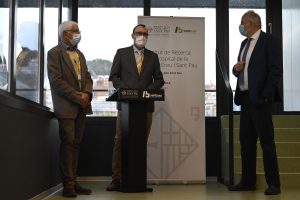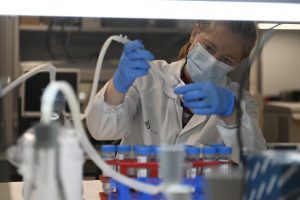Eighteen years after the publication of the human genome, we know that there is still a long way to go in studying the genome and its relationship to health. Today, the Sant Pau Research Institute – IIB Sant Pau and the Autonomous University of Barcelona have taken a step forward to shorten this path and bring genomic research closer to medicine and clinical practice, with the creation of the Joint Research Unit in Genomic Medicine UAB – IR Sant Pau. The new unit was inaugurated today in an event attended by Dr. Javier Lafuente, rector of the UAB; Dr. Manel Balcells, chairman of the board of the Research Institute, Dr. Jordi Bachs, managing director of the Private Foundation Hospital de la Santa Creu i Sant Pau and Dr. Jordi Surrallés, director of the Sant Pau Research Institute.

The Joint Research Unit in Genomic Medicine UAB – IR Sant Pau has had the support of the Private Foundation Hospital de la Santa Creu i Sant Pau, which has funded the works of adaptation of the space for the laboratory making possible 177 m2 for state-of-the-art research. For its part, the UAB will also contribute to the Sant Pau Research Institute in the next six years, the equivalent of the cost of the work for the creation and start-up of this unit. In this new space, the joint research unit focuses, above all, on the diagnosis, pathophysiology and development of new therapies for genetic diseases and tumor predisposition syndromes.
“The research we do at the Sant Pau Research Institute is translational and by our nature, we connect research with clinical practice. The creation of the joint research unit in Genomic Medicine UAB – IR Sant Pau further strengthens our mission by incorporating basic research, training professionals in this important field for personalized and precision medicine and completing the cycle” says Dr. Jordi Surrallés, director of the Sant Pau Research Institute and professor ICREA Academia at the UAB.
“It is important to bridge academia, biomedical research institutes and hospitals to reinforce the triple mission of high-complexity hospitals such as Hospital de Sant Pau: care, research and teaching; and to create spaces, such as this unit, where this interaction happens”, he concludes.
On his behalf, the Rector of the UAB, Javier Lafuente, explains: “The UAB is a benchmark in the field of biomedicine and genetics, being the only university in Spain to offer a degree in Genetics, and the creation of the Joint Research Unit in Genomic Medicine UAB – IR Sant Pau reaffirms the University’s commitment to this field”.
The rector highlights the satisfaction of “having a unit of this nature, the first joint unit of the UAB in this field, with researchers from both institutions working together in the research of genetic diseases, their diagnosis and treatment”.
The unit becomes a reality today, but was under the mandate of the previous director of the Research Institute, Dr. Jaume Kulisevsky, when the project began to take shape in 2017 as Dr. Jordi Surrallés joined the Sant Pau Hospital as Director of the Genetics Service and integrated his research group. In October 2019, a collaboration agreement was signed between the three institutions that have made it possible. And now, once the works are completed, the research group coordinated by Dr. Jordi Surrallés is occupying this new space of 177 m2 from where they will carry out their research projects. The team of the unit currently consists of 17 people with multidisciplinary profiles including experts in biology, genetics, medicine, biochemistry, biotechnology, bioinformatics or data science.
Understanding genomic instability to protect us from cancer and advance in personalized medicine

The research group that forms the unit works in the field of human genetic diseases, characterized by a high predisposition to cancer. Many of these syndromes are caused by mutations in genes involved in DNA repair. These genes are important in preventing the buildup of mutations and preventing tumor transformation.
Research on these syndromes is important to unravel the mechanisms that protect us from cancer. There are increasingly new therapeutic strategies based on deep knowledge of the genetic causes of the disease. Therefore, proper genetic diagnosis is important not only to provide good genetic counselling and clinical follow-up on patients and their families, but also to provide personalized medicine based on genomic information.